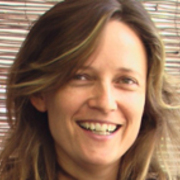
Gaylene Barnes
Long based in the South Island, Southland-born Gaylene Barnes has worked in almost every screen job running: from designing the opening graphics of TV shows, to calling the shots on set and then editing them afterwards. Along the way she has designed classic Dunedin movie Scarfies, and created her own multimedia works to play across six screens at Christchurch Airport.
In her 20s Barnes was one of the first students to complete the Computer Art course at Otago Polytechnic. She went on to complete a Bachelor of Arts in Art and Film History, at Otago University. Inbetween polytech and university, she spent time as a graphic artist at TVNZ, and worked for Dunedin-based company Animation Research.
She also joined Dunedin filmmaking collective Nightmare Productions. In 1996 she production designed Nightmare's adventurous short Signing Off. She would take the same role on Scarfies, the hit movie that put the Dunedin student experience on film. Barnes was nominated for her work at the 2000 NZ Film Awards.
The same year she set up company Raynbird Productions in Christchurch. Though there have been a number of directing projects since, she has been found most often in the editing suite — where her graphics skills have been useful on everything from Emmy award-winning animal series Twisted Tales to foodie show Hunger for the Wild. Barnes was nominated for a best editing award for Gerard Smyth's Out of Sight,Out of Mind, a documentary about some of those trapped for decades in so-called 'psychopaedic' hospitals.
Barnes has worked on a number of Christchurch-centric projects with local filmmakers, including Virginia Wright's We are One: The Mosque Attacks One Year On, and Smyth's post-quake doco When a City Rises. She also still does occasional design jobs for dramas (Kaitangata Twitch, big screen romance Meet Me in Miami) and commercials.
On the directing front, Barnes has helmed everything from music videos to three-part series The Grand Plan (about the post-quake reinvention of a dilapidated Christchurch hotel). She has also directed two dramatic shorts: Mother's Day, a tale of revenge that made her wary of portraying violence on screen, and (as writer and co-director) The Mobile Meat Processing Unit, an animated short exploring the downside of the capitalist dream. It played in the 2013 round of the NZ Film Festival.
In 2023 Barnes directed River of Freedom. The feature documentary chronicles the story of the anti-vaccine-mandate protesters who formed a convoy and occupied New Zealand's parliament grounds in early 2022. Of the film, she has said "I believe the vaccine mandates implemented across the Western world during 2021 and 2022 were an immoral violation of human dignity. This inspired me to use my skills as a filmmaker to document the convoy protest from its beginning."
Barnes has also edited multiple feature-length documentaries with Christchurch filmmaker Kathleen Gallagher: cancer doco He Oranga He Oranga - Healing Journeys, and environmental docos Earth Whisperers: Papatuanuku and Rohe Kōreporepo. In 2017 Barnes brought her diverse range of skills to Seven Rivers Walking - Haere Mārire, which was invited to play at the 2017 Christchurch Film Festival. This time Barnes co-directed with Gallagher. The documentary uses a range of interviews to examine how the rivers of Christchurch and the Canterbury Plains have been exploited by agri-business.
In a 2007 interview Barnes admitted to having an ongoing conflict between "the organic", and living a simple life, and her love for technology. She continues to paint — and freelance on varied screen projects.
Profile updated on 5 September 2023
Sources include
Gaylene Barnes
Gaylene Barnes website. Accessed 5 September 2023
River of Freedom website. Accessed 5 September 2023
Raynbird Productions website. Accessed 17 July 2017
The Mobile Meat Processing Unit website. Accessed 26 September 2022
Janet Joyce, 'Director's cut' (Interview) - CS Arts, June 2007, Issue 27, page 1
Press kit for River of Freedom